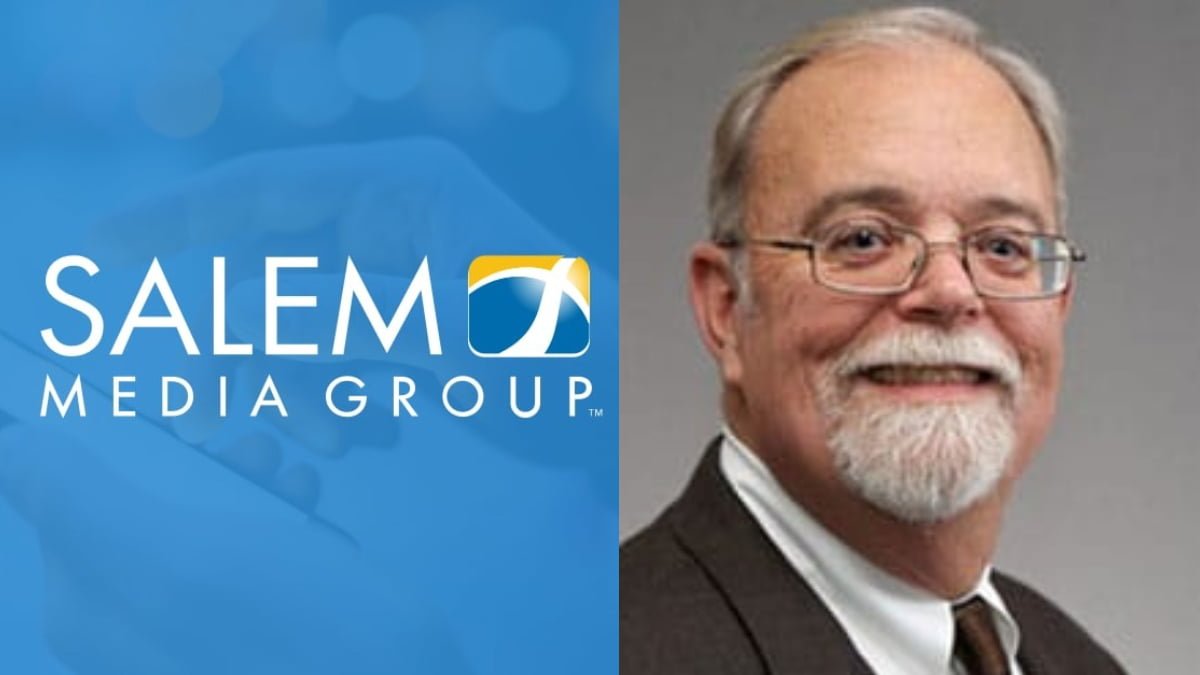There are instances where being a bull in a China shop isn’t the worst thing.
“I’m kind of a bomb-tosser,” said Tom Tradup, vice president of news and talk programming at Salem Radio Network.
Tradup majored in political science at the University of Alabama. What he really wanted to do was go to Washington, get congressmen elected, and write some laws. Radio broadcasting wasn’t a blip on his radar.
“Political jobs weren’t easy to find in D.C.,” Tradup explained. “They wanted people like Karl Rove, John Dean, people like that.”
Admittedly, his entry into politics was a bust.
“The first and only politician I worked for was in the 70s,” Tradup said. “He was an investment banker in Boston and he asked me to manage his congressional campaign. He was running against Paul Tsongas.”
Thanks to Tradup’s fledgling skills and neophyte approach, his candidate lost by a landslide, running against future presidential candidate Paul Tsongas.
“It’s good to be known for something,” Tradup jokes. “We lost by the largest landslide of Massachusettes, which dated back to the Pilgrims. And with a breadth of responsibilities within his network, Tradup finds time to smile.
In the first election, Tradup admits he didn’t vet his opponent well enough.
“Tsongas never held a real job in his life,” Tradup said. “He went to Dartmouth, then joined the Peace Corps. That’s not a real job. He was on the city council of Lowell and quit to become Middlesex County commissioner.”
That dubious experience prompted Tradup to exit hands-on politics for good. Still, he wondered where he could still harness his love of affairs of state, so he decided he’d cover politics as a journalist. He started working for WCNY, the public radio station in Syracuse.
“I covered state and local news, and was a regular on All Things Considered. I didn’t get paid much, but I got all the free tote bags I wanted. I became a connoisseur of Ramen Noodles.”
His first stop in commercial radio was in Columbia, Missouri at KTGR, the Tiger. This was the beginning of what Tradup termed his recurring ‘two year plans.’ Essentially spending two years in each job until he ended up with Salem, his tenure nearly three decades. At the time KTGR was a country music daytimer. That wasn’t where the fun ended.
“At the top of the hour for the legal ID, we had to growl,” Tradup recalls. “You know, like a tiger growling. We’d say, “It’s 1:30 at KTGR…(insert growl here.)”
Tradup was less than thrilled.
“I told the station manager that I knew I was just a young guy, but as the station’s news director, it was humiliating to have to growl. I asked if there was some kind of sound effect of a growl we could use instead. He screamed, ‘No, you S.O.B. Folks love that.”
After he’d had his fill of growling, Tradup moved down the road to KCMO/Kansas City for two years, then on to New York and WMCA AM as a morning show producer. The station had legendary hosts like Bob Grant and Barry Farber. The station was owned by R. Peter Straus doing business as Straus Communications. Straus was director of Voice of America under President Jimmy Carter.
“We were a little radio station in the middle of Midtown Manhattan,” Tradup said. “We were small, but there were a lot of ears tuning in to our station. We had everybody on that station; Ed Koch, Mario Cuomo, David Dinkins, Rudy Guiliani. It was great for me because I loved politics.”
Then he got a call from WASH FM and John Kluge. He told Tradup they needed an operations manager.
“Kluge told me they wanted a new morning show and asked if I’d create it,” Tradup said. “I did and it was called Continental Breakfast with Arthur Crofton and Linda Sherman.”
Crofton was American, but he had British parents and had the Alistaire Cooke accent working. “It was a soft rock format. Crofton was the British touristy type, and Linda had the American perspective. We’d do a different remote every month. The show did well, it punched through. It can be very hard when you’re doing something new. Harden and Weaver ruled the roost in the market, but we were a strong second.” Harden and Weaver Show was the top show in D.C. for more than 38 years.
After that, it was KRLD in Dallas, a 50,000-watt station with rating problems.
“On Sundays we had the Cowboys, but they said they needed someone to juice things up during the week,” Tradup said. Tradup was the juicer.
“One of the first things I did was replace an operations director who had been there for 17 years. They were doing a lot of things by rote, them saying things were always done that way. I think if you bring in a fresh perspective it always helps. We brought in full-time news staff, helicopters.”
Tradup said that was when the station produced features during Cowboy games. Shows like Coaches Corner, and shows with Preston Pearson and Bullet Bob Hayes.
“When I arrived I remember listening to former Cowboy player Bob Lilly’s show, which was sponsored by a local grocery store. I thought it was kind of boring. The KLRD guy was asking him a lot of boring questions and I realized the show had to go.”
It’s not easy to tell “Mr. Cowboy,” a fierce defensive tackle, his show was going to be axed. It turned out to be just fine with Lilly.
“He was living in Colorado, a very nice guy, a professional photographer at the time,” Tradup said. “I called and said, ‘I said I hate to do this to you, but I was thinking I have to cancel your show.’”
To Tradup’s surprise, Lilly was totally cool with it. He told Tradup he couldn’t understand why the station had him doing the show in the first place. He didn’t really know or relate to the younger players. Lilly said they’d just wanted him to talk about the ‘old days.’
This was also about the time Jerry Jones had just come to Dallas, and everybody knew he was going to fire Tom Landry and bring in his pal Jimmy Johnson.
“I don’t think you could argue from a business decision, but it was the way he handled it that bothered me,” Tradup said. “I remember picking up the now defunct Dallas Herald and there was a color photo of Jones and Johnson celebrating their new era at Mia’s Tex-Mex Restaurant. The reason this was not appropriate is this was Landry’s favorite Mexican restaurant. It was his place. Not very classy.”
Then came the storied WLS radio in Chicago. He’d gotten a call from the late Norm Schrutt, at the time the ABC group president who oversaw the station. He asked Tradup if he wanted to come to WLS. Tradup was dating his future wife Lori and didn’t want to mess that up with a move.
“The first question Norm asked me was whether I wanted to come to WLS and I answered ‘no.’ The second question he asked was, ‘are you stupid?’”
Not the beginning of a great interview.
Schrutt told Tradup he was offering him a 50,000-watt radio station owned by Capital Cities/ABC. Reminded him they owned ESPN, and that they even had cable deals in China.
Schrutt continued. “Don’t you understand? Chicago is the third largest market. You’re in Dallas.”
Tradup knew what market he was in. He got the trade magazines. As you may have guessed, Tradup eventually went to WLS.
“Norm introduced me to the staff. He told me while I was running the station that it’s my baby. It’s nice nobody can tell you what to do, but it’s your butt on the line when things go bad.”
After unpacking at his new home in Chicago, Tradup had his first experience with Sun Times media columnist Robert Feder.
“Norm had told me there was one guy I should never talk to. That was Robert Feder. My first reaction was ‘why?’ I was taking over a new station and it was in everybody’s best interest if I got along with this guy.”
Schrutt told Tradup that Feder was the guy who destroyed WLS. When Tradup came to WLS, they were 27th in the market and were hemorrhaging money with a 1.3 share.
“Feder operated on the theory that when there’s smoke there’s fire,” Tradup explained. “When salespeople saw bad writing on the wall, they’d jump ship, and he’d write about that. Other people would get nervous and leave. Feder would attack the station on this and that. When I got there Don Wade and Roma were there. They’re the only people I kept when I came on board. The station was still playing music when I got there.”
Tradup said during a typical hour on that incarnation of WLS, you’d hear a Dean Martin song followed by a Phil Collins song. It was a big bowl of dirty soup. When WLS flipped to talk, Robert Feder flipped too. He grew up with Dick Biondi, John Landecker’s Boogie Check, Old Uncle Larry.
“Robert Feder figured if Norm hired me I must have been a bad guy,” Tradup said. “I asked my assistant Lanette to get Feder on the phone. The color drained from her face and she asked me if I knew about the bad blood between Norm and Feder? I said I did, and she got him on the phone. ‘What the heck is your problem?’ I said to Feder.”
‘I beg your pardon?’ was Feder’s reply.
Tradup asked Feder why he had such a bone to pick with WLS.
Feder told Tradup he grew up necking with his wife on WLS along Lake Michigan. He talked about all the history of the station, including WLS being the station that ran the Hindenburg disaster. A whole lot of colorful radio history and necking. And he saw ABC as an out-of-town, absentee landlord that didn’t appreciate WLS as a Chicago institution.”
“I told him I’d hoped he’d find I was a good guy, even though he didn’t know me,” Tradup said. “I had a lot of good ideas. It wasn’t like Chicago really needed another talk station. In those days, Chicago didn’t need another friendly WGN. You couldn’t be hipper than The Loop.”
“I told him I’d make a deal with him,” Tradup explained. “I’d give him complete access to what I was thinking or planning. If I was going to change talent in a day part, I’d tell him. I promised I’d never say ‘no comment.’ I only asked him two things; Don’t take something I say out of context to make me sound stupid. I could do that well enough on my own. I also told him I’d give him a heads–up if something was coming down the road. We agreed and we’re still friends to this day.”
Tradup said his Christian faith and background in journalism have taught him candor, integrity and truth-telling always are the best policy in the long run.
“If people learn anything from this interview, I hope they’ll take that advice to heart.”

Jim Cryns writes features for Barrett News Media. He has spent time in radio as a reporter for WTMJ, and has served as an author and former writer for the Milwaukee Brewers. To touch base or pick up a copy of his new book: Talk To Me – Profiles on News Talkers and Media Leaders From Top 50 Markets, log on to Amazon or shoot Jim an email at jimcryns3_zhd@indeedemail.com.







